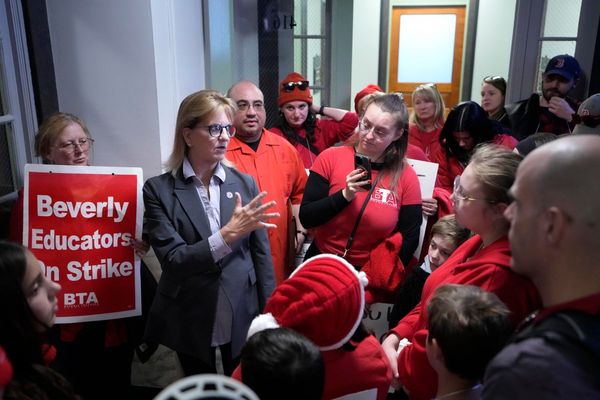
It has been a tough week for Anthony Albanese. The prime minister earned headlines for his apparent tetchiness, defended claims his government is “mired in mediocrity”, and has been compared to his predecessor Scott Morrison. But is Albo really the new ScoMo? That’s the question we’re debating in today’s Friday Fight.
Arguing in the affirmative we have writer and comedian Patrick Marlborough. And making the case for the negative is political columnist Rachel Withers.
Don’t forget to vote for your debate winner in the poll at the bottom of this article!
It has been tempting, over the past 28 months, to liken Prime Minister Anthony Albanese to his predecessor Scott Morrison. I myself have done it, particularly when he parrots Coalition fallacies about “clean coal”, or ignores desperate constituents, trying to hide from protesters while spruiking a stadium.
Australia’s 31st prime minister, like our 30th, has been prickly, thin-skinned, defensive and tone-deaf, eager to endear himself to the likes of Kyle Sandilands. He is behaving, as Greens Senator Sarah Hanson-Young deliberately put it, like a “bulldozer” in his approach to the Senate. Like Morrison, he is irrationally stubborn, driven by petty grievance, and willing to let politics get in the way of outcomes. He continually makes unforced errors, such as his apparent captain’s call to scrap the LGBTQIA+ census questions, and is showing more interest in protecting kids from “social media” than from climate change, incarceration, gambling harms, or poverty.
But there remains a fundamental difference between the pair, a difference that could be the thing that saves Albanese’s prime ministership.
Anthony Albanese once believed in something. “ScoMo” was always defined, politically, by an absence; as former political editor Katharine Murphy wrote in her Quarterly Essay on him (quoting Gertrude Stein), there was “no there there” (Murphy now works as a media adviser to Albanese). “Albo”, meanwhile, grew up working class in public housing (as he never tires of reminding us), with what one must presume was a real class consciousness.
While he now condenses his faiths to the naff trio of Catholic Church/Labor Party/Rabbitohs, it’s fair to say young Albo was driven by a sense of injustice (though some dispute that). In his 1996 maiden speech, the future PM said he hoped to “be remembered as someone who will stand up for the interests of my electorate, for working-class people, for the labour movement”. Morrison used his to quote from the Book of Joel. Albanese, as Crikey has noted, was once one of Labor’s most pro-Palestine MPs, while The Daily Telegraph has spent countless pages on his “hard left” origins, laying out his changing views.
What happened to Albanese to turn him from left-wing firebrand into cowardly centrist, contorting himself into smaller and smaller Morrison-shaped holes? It’s clear party politics changed the member for Grayndler, his interest in rising up (and controlling) the ALP coming at the expense of many of his values. He now seems obsessed with power for power’s sake, reluctant to do anything that could upset the “aspirational” (“no one held back”, after all), big business (“proudly pro-business and pro-worker,” he posted slavishly from this week’s BCA dinner), or the Murdoch media.
Like many in Labor, he remains scarred by Bill Shorten’s 2019 defeat, convinced it came down to being too bold, and unwilling to ever be so again, even as the electorate changes around him. Unlike Morrison, who made division his calling card, Albanese wants to be liked — by everyone — often to his own political detriment. He appears to have drifted right with age, transitioning from working-class kid to wealthy property investor with little shame, seemingly unable to fathom how remote that path has become. His territorial hatred of the Greens political party, meanwhile, has him totally bent out of shape, unable to see that they increasingly speak for those “left behind”.
Is Albanese’s there still there? The PM would have progressives believe so, often defending his slow pace of change as a necessary part of maintaining it. Speaking to RN Breakfast on Thursday, he pushed back (brittly, of course) on the idea his government had been “timid”, pointing to changes to the stage three tax cuts as proof they were not so. But it’s telling that tweaking a regressive Coalition tax policy, following months of defending it, in a way that still left the rich with the biggest cut, is the bravest move this one-time revolutionary can cite, at a time of acute economic pain for the poor.
Much of that pain is not Albanese’s fault; he is clearly frustrated at being lashed for this inflation crisis, for our broken housing market, and for the deep inequities in Australian society. But that frustration won’t be enough to convince voters he deserves another go, just as Morrison’s self-pity fell flat. Minority government now looks all but guaranteed. And a bulldozer is the last thing a multi-partisan Parliament will need.
Anthony Albanese, who once professed to enjoy “fighting tories”, is not Scott Morrison. But perhaps it’s time he stopped acting like him, lest he find himself out of office, muttering “not my job, not my job, not my job…”
Read the opposing argument by Patrick Marlborough.







